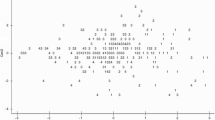Abstract
The present analysis sought to determine the usefulness and validity of the Short Acculturation Scale for Hispanics (SASH) in assessment of acculturation among Hispanics participating in a colorectal cancer screening study. Primary data was collected from 2008 to 2009 through surveys in East Harlem community-based sites and health clinics among Hispanics. Bivariate correlations and independent samples t tests assessed SASH correlation with acculturation proxies and relationships between proxies, SASH, and sociodemographics. SASH was highly correlated with commonly used acculturation proxies; inter-scale correlations and alpha scores were high. Sociodemographics associated with proxy variables were associated with SASH. In conclusion, SASH is useful and valid for assessing acculturation among Hispanics; however, a shortened version or acculturation proxy variables could also be utilized.
Similar content being viewed by others
References
Grieco EM, Trevena EN. 2010. Place of birth of the foreign-born population: 2009. American Community Survey Briefs. http://www.census.gov/prod/2010pubs/acsbr09-15.pdf. Accessed 23 March 2011
Pew Hispanic Center. 2011. Table 4. Hispanic population by nativity and citizenship status: 2000 and 2009. Statistical portrait of Hispanics in the United States, 2009: http://pewhispanic.org/files/factsheets/hispanics2009/Table%204.pdf. Accessed 23 March 2011
Brach C, Fraserirector I (2000) Can cultural competency reduce racial and ethnic health disparities? A review and conceptual model. Med Care Res Rev 57:181–217
Kreuter MW, Wray RJ (2003) Tailored and targeted health communication: strategies for enhancing information relevance. Am J Health Behav 27(Suppl 3):S227–S232
Abraido-Lanza AF, Armbrister AN, Florez KR, Aguirre AN (2006) Toward a theory-driven model of acculturation in public health research. Am J Publ Health 96:1342–1346
Lara M, Gamboa C, Kahramanian MI, Morales LS, Bautista DE (2005) Acculturation and Latino health in the United States: a review of the literature and its sociopolitical context. Annu Rev Publ Health 26:367–397
Arcia E, Skinner M, Bailey D, Correa V (2001) Models of acculturation and health behaviors among Latino immigrants to the US. Soc Sci Med 53:41–53
Carter-Pokras O, Zambrana RE, Yankelvich G, Estrada M, Castillo-Salgado C, Ortega AN (2008) Health status of Mexican-origin persons: do proxy measures of acculturation advance our understanding of health disparities? J Immigr Minor Health 10:475–488
Hunt LM, Schneider S, Comer B (2004) Should “acculturation” be a variable in health research? A critical review of research on US Hispanics. Soc Sci Med 59:973–986
Cabassa LJ (2003) Measuring acculturation: where we are and where we need to go. Hispanic J Behav Sci 25:127–146
Ryder AG, Alden LE, Paulhus DL (2000) Is acculturation unidimensional or bidimensional? A head-to-head comparison in the prediction of personality, self-identity, and adjustment. J Pers Soc Psychol 79:49–65
Jemal A, Murray T, Samuels A, Ghafoor A, Ward E, Thun MJ (2003) Cancer statistics, 2003. CA Cancer J Clin 53:5–26
Calonge N, Petitti DB, Dewitt TG, Dietrich AJ, Gregory KD et al (2008) Screening for colorectal cancer: US preventive services task force recommendation statement. Ann Intern Med 149:627–637
American Cancer Society. 2008. Colorectal facts and figures 2008-2010.. http://www5.cancer.org/downloads/STT/F861708_finalforweb.pdf. Accessed 23 March 2011
Geiger TM, Miedema BW, Geana MV, Thaler K, Rangnekar NJ, Cameron GT (2008) Improving rates for screening colonoscopy: analysis of the health information national trends survey (HINTS I) data. Surgical Endoscopy and Other Interventional Techniques 22:527–533
Jandorf L, Ellison J, Villagra C, Winkel G, Varela A et al (2010) Understanding the barriers and facilitators of colorectal cancer screening among low income immigrant Hispanics. J Immigr Minor Health 12:462–469
Marin G, Sabogal F, Marin BV, Otero-Sabogal R, Perez-Stable EJ (1987) Development of a short acculturation scale for Hispanics. Hispanic J Behav Sci 9:183–205
Marin G (1996) A new measurement of acculturation for Hispanics: the bidimensional acculturation scale for Hispanics (BAS). Hispanic J Behav Sci 18:297–316
Schwartz SJ, Zamboanga BL (2008) Testing Berry's model of acculturation: a confirmatory latent class approach. Cult Divers Ethnic Minor Psychol 14:275–285
The Short Acculturation Scale for Hispanics (SASH). 1995. http://dgim.ucsf.edu/diversity/SASH_manual.pdf. Accessed 23 March 2011
Author information
Authors and Affiliations
Corresponding author
Rights and permissions
About this article
Cite this article
Ellison, J., Jandorf, L. & Duhamel, K. Assessment of the Short Acculturation Scale for Hispanics (SASH) Among Low-Income, Immigrant Hispanics. J Canc Educ 26, 478–483 (2011). https://doi.org/10.1007/s13187-011-0233-z
Published:
Issue Date:
DOI: https://doi.org/10.1007/s13187-011-0233-z



